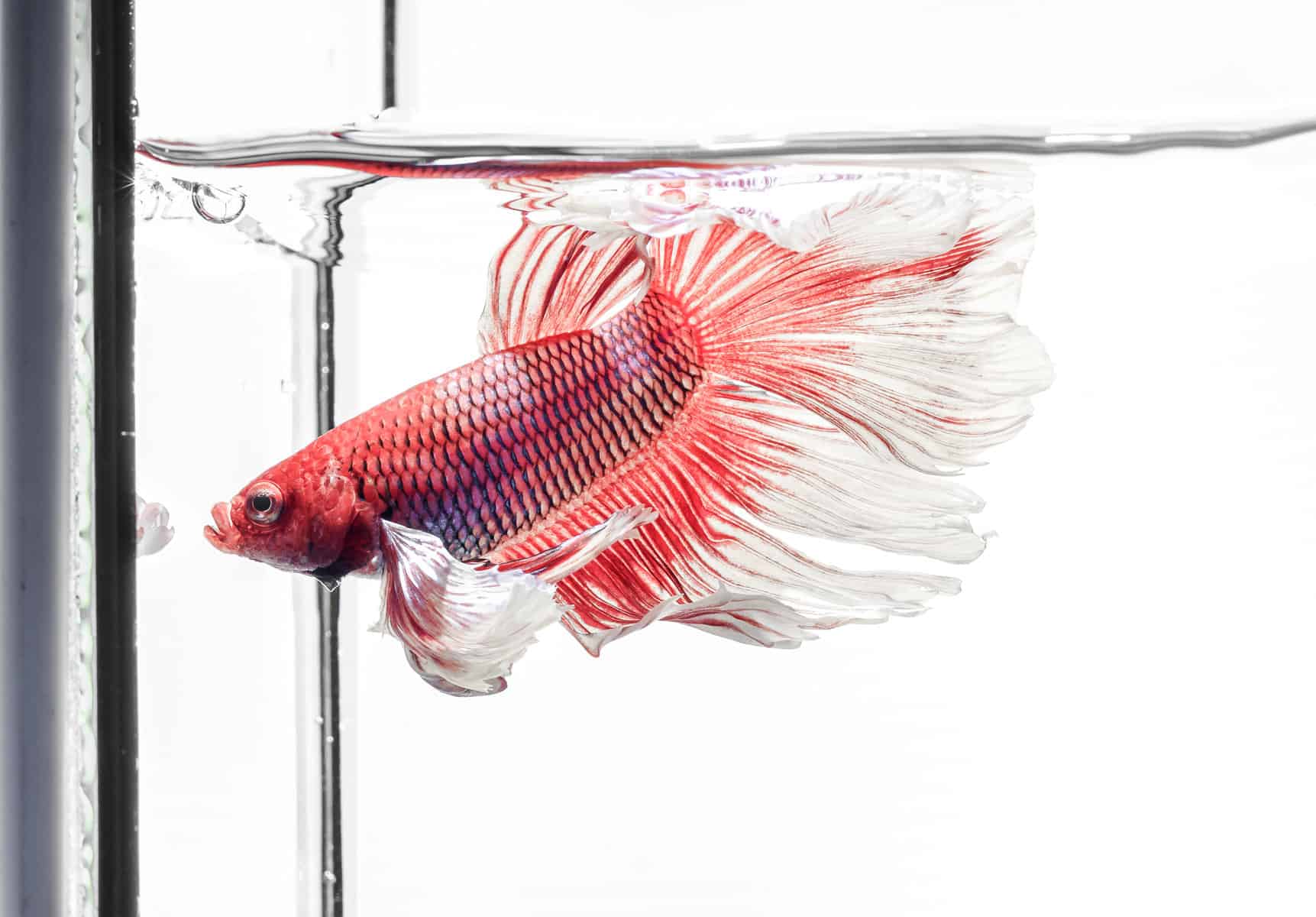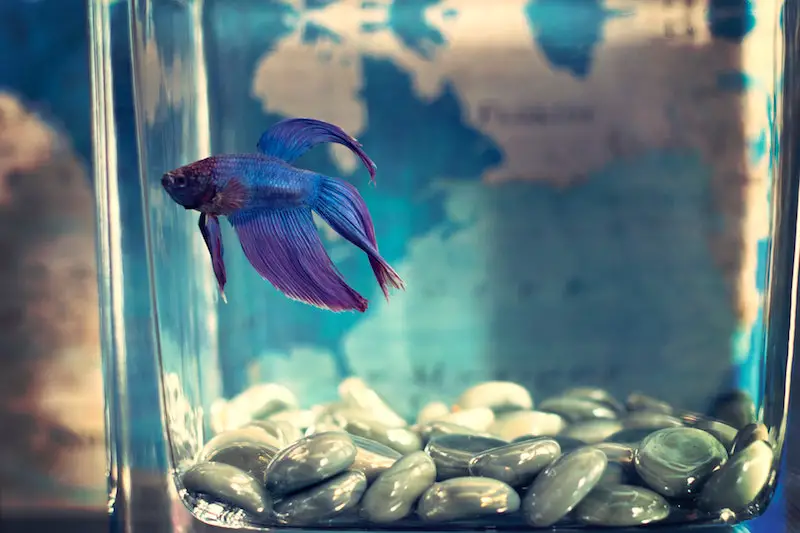Betta fish, also known as Siamese fighting fish, are known for their vibrant colors and long flowing fins. These fish are popular pets for their beauty and low maintenance requirements. However, pet owners often wonder if they can keep their betta fish in tap water.
The question of whether or not a betta fish can live in tap water is a common concern among pet owners. While tap water may seem like a convenient option, it is important to understand the potential risks and necessary precautions to ensure the health and well-being of your betta fish.
Yes, a betta fish can live in tap water, but it is not recommended. Tap water contains chemicals such as chlorine and chloramine, which can harm and even kill your betta fish. It is best to use a water conditioner to remove these harmful chemicals before adding tap water to your betta fish tank. Additionally, betta fish prefer water that is slightly acidic and warm, so it’s important to monitor the pH and temperature levels regularly.

Can a Betta Fish Live in Tap Water?
If you’re a proud owner of a Betta fish, you may be wondering whether tap water is suitable for your pet’s survival. Betta fish are delicate creatures that require a specific environment to thrive, and the type of water you provide is one of the significant factors that contribute to their well-being. In this article, we will explore whether Betta fish can live in tap water, and what steps you can take to ensure their health and happiness.
Understanding the Water Chemistry
The water chemistry is one of the most crucial aspects of keeping a Betta fish healthy. Tap water typically contains chlorine, chloramines, and heavy metals that can be harmful to your fish. Chlorine is a disinfectant that is added to the water supply to kill harmful bacteria and viruses. Chloramines are a combination of chlorine and ammonia, which are toxic to fish. Heavy metals such as copper and lead can also be found in tap water, which can be lethal to Betta fish.
To make tap water safe for Betta fish, you need to neutralize the chlorine and chloramines and remove the heavy metals. One way to do this is by using a water conditioner that is specifically designed for Betta fish. These products work by detoxifying the water and removing harmful chemicals and heavy metals. You can find water conditioners at your local pet store or online.
Another way to make tap water safe for Betta fish is by letting the water sit for at least 24 hours before adding it to the tank. This allows the chlorine and chloramines to evaporate, making the water safe for your fish.
Benefits of Using Tap Water
Using tap water for your Betta fish can have a few benefits. Firstly, it’s convenient and readily available. You don’t have to go out and purchase special water for your fish, which can save you time and money. Secondly, tap water contains essential minerals that are beneficial for your fish’s health. These minerals can help strengthen their immune system and promote healthy growth.
If you’re going to use tap water for your Betta fish, it’s essential to ensure that it’s safe and free from harmful chemicals and heavy metals. You can do this by using a water conditioner or letting the water sit for at least 24 hours.
Tap Water vs. Bottled Water
Many Betta fish owners wonder whether bottled water is a better option than tap water. While bottled water may seem like a safer and more convenient option, it’s not always the case. Bottled water is often sourced from natural springs or underground wells, which can contain high levels of minerals and other impurities. These minerals can affect the pH levels of the water and make it unsuitable for Betta fish.
Tap water, on the other hand, is treated and regulated to ensure that it’s safe for human consumption. While it may contain harmful chemicals, these can be neutralized with the use of a water conditioner or by letting the water sit for 24 hours.
Conclusion
In conclusion, Betta fish can live in tap water if it’s treated and made safe for them. Using tap water for your fish can be convenient and beneficial, but it’s essential to ensure that it’s free from harmful chemicals and heavy metals. You can do this by using a water conditioner or letting the water sit for 24 hours. It’s also important to monitor the pH levels and temperature of the water to ensure that it’s suitable for your Betta fish’s needs. With the right care and attention, your Betta fish can live a long and healthy life in tap water.
Frequently Asked Questions
Can a Betta Fish Live in Tap Water?
Yes, betta fish can live in tap water, but it’s not recommended. Tap water contains chlorine and chloramines that can harm your betta fish. Chlorine can damage the fish’s gills, while chloramines can lead to ammonia poisoning. If you must use tap water, make sure to treat it with a water conditioner that removes chlorine and chloramines before adding it to your betta fish’s tank.
It’s also important to note that tap water may contain other harmful substances like heavy metals and pesticides. These substances can accumulate in your betta fish’s body and cause health problems over time. Therefore, it’s best to use filtered or bottled water to ensure that your betta fish has a healthy and safe environment to live in.
How Often Should I Change the Water in My Betta Fish Tank?
You should change the water in your betta fish tank at least once a week. Betta fish are sensitive to poor water quality, and their tanks can quickly become polluted with waste, uneaten food, and other debris. Regular water changes help to maintain a healthy and clean environment for your betta fish.
When changing the water, make sure to remove any uneaten food and debris from the tank. Use a siphon to remove about 25-50% of the water and replace it with fresh, conditioned water that is the same temperature as the tank. It’s important to avoid changing all the water at once, as this can disrupt the beneficial bacteria that live in the tank and help to maintain a healthy environment for your betta fish.
What Should I Feed My Betta Fish?
Betta fish are carnivores and should be fed a high-protein diet that is specifically formulated for their nutritional needs. You can feed your betta fish pellets, flakes, or frozen food like bloodworms or brine shrimp. It’s important to avoid overfeeding your betta fish, as this can lead to obesity and other health problems.
A good rule of thumb is to feed your betta fish 2-3 pellets or flakes twice a day. You can also supplement their diet with frozen or live food once or twice a week. Make sure to remove any uneaten food from the tank to prevent it from polluting the water and causing health problems for your betta fish.
How Do I Know If My Betta Fish is Sick?
There are several signs that your betta fish may be sick, including a loss of appetite, lethargy, clamped fins, and discoloration. Other signs of illness include gasping for air at the surface of the water, swimming erratically, and visible parasites or lesions on the fish’s body.
If you notice any of these signs, it’s important to take action right away. Check the water quality in the tank and make sure that it’s within the appropriate parameters for betta fish. You may need to change the water more frequently or adjust the temperature or pH levels in the tank. If the problem persists, consult a veterinarian who specializes in fish health to diagnose and treat your betta fish’s illness.
Can I Keep Multiple Betta Fish Together?
It’s not recommended to keep multiple betta fish together in the same tank, as they are aggressive and territorial fish. Male betta fish, in particular, will fight with each other and can cause serious injury or even death.
If you want to keep multiple betta fish, you can set up separate tanks for each fish or choose other compatible fish species to live in a community tank. Make sure to research the specific needs and behaviors of each fish species before adding them to your tank to ensure that they can coexist peacefully.

Can Betta Fish Live in Tap Water?
In conclusion, the question of whether a betta fish can live in tap water is a complex one. While some bettas can survive in tap water, it is not always the best environment for them. The quality of tap water can vary greatly depending on where you live, and many tap water sources contain harmful chemicals that can harm your betta fish.
If you are considering keeping a betta fish as a pet, it is important to take the time to research the best water conditions for their health and well-being. This may mean investing in a water filtration system or using bottled water to ensure that your betta has the cleanest and safest environment possible.
Ultimately, the decision of whether to keep a betta fish in tap water will depend on your individual circumstances and the quality of your local water supply. By taking the time to educate yourself and make informed decisions, you can help ensure that your betta fish thrives in their new home.
